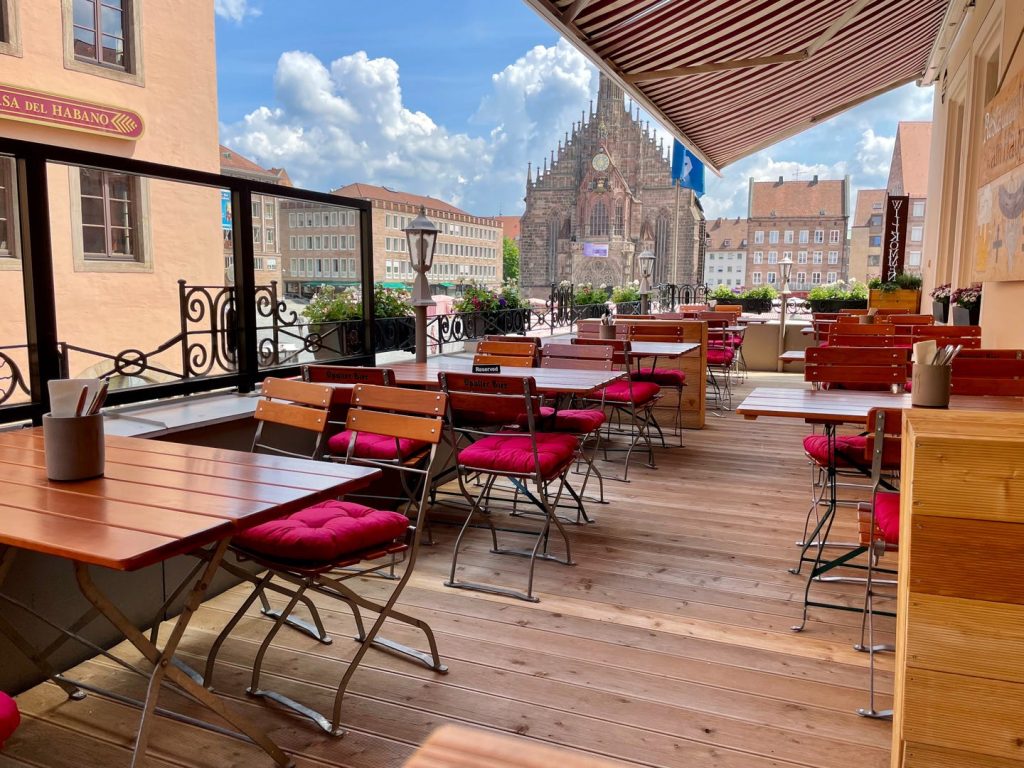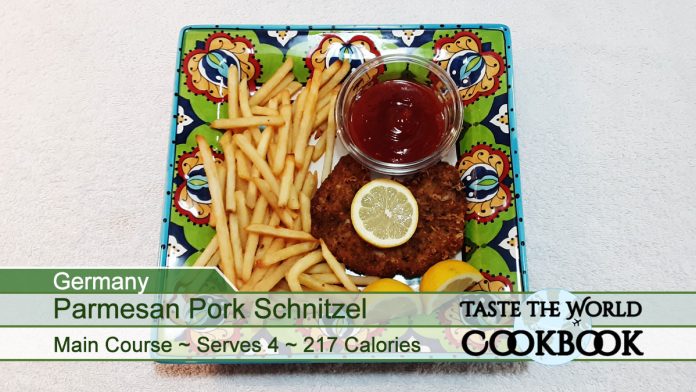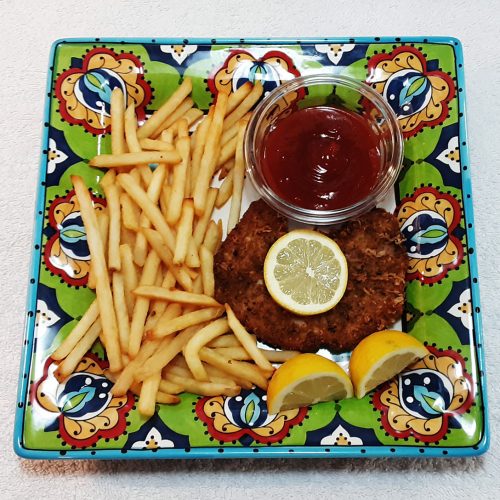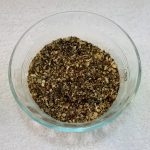Enjoy the delightful combination of flavor and texture in our Parmesan and Herb Pork Schnitzel, a dish that’s both surprisingly simple to make and irresistibly delicious to taste. Each piece promises a satisfying crunch from the golden, crisp exterior, perfectly complementing the tender, juicy pork within.
Table of contents
Known as “Schnitzel Wiener Art” in German cuisine, this dish is renowned for its captivating contrast. The delicate, yet rich, flavors of Parmesan and herbs enhance the pork’s natural savoriness, creating a taste profile that’s complex and comforting.
Every bite of the Parmesan and Herb Pork Schnitzel delivers a sensory experience that’s truly unique. The hearty meat, the rich cheese, and the aromatic herbs harmonize to create a schnitzel that’s more than a meal—it’s an invitation to savor and celebrate the finer things in life.
Mastering the Art of Schnitzel: Diverse Styles and Global Influence
Schnitzel, a dish rooted in German culinary heritage, presents a myriad of ways to enjoy this breaded delight. The Germans, often credited with its invention, have fine-tuned the recipe to offer no less than five distinct styles, each with its unique flavor profile and preparation method.
- Schnitzel Wiener Art (Viennese style schnitzel) is a pounded, breaded and fried cutlet, more often made of pork than of veal.
- Jägerschnitzel (hunter’s schnitzel) is a schnitzel with mushroom sauce.
- Zigeunerschnitzel (Gypsy schnitzel) is a schnitzel with a zigeuner sauce containing tomato, bell peppers, and onion slices.
- Rahmschnitzel (cream schnitzel) is a schnitzel with a cream sauce.
- Münchner Schnitzel (Munich schnitzel) is a variation on the Wiener schnitzel prepared with horseradish or mustard before coating in flour, egg and bread crumbs.
The beauty of schnitzel lies not only in its diversity but also in its global appeal. Whether it’s the veal, pork, chicken, mutton, beef, or turkey variety, you can find this beloved dish served worldwide. In France, it transforms into the “escalope”, Japan introduces it as “tonkatsu”, Italy presents the “cotoletta”, and Poland offers the “kotlet schabowy”. Further afield, it becomes the “milanesa” in Mexico, “chuleta valluna” in Colombia, and “chicken fried steak” in the Southern United States. Whichever version you choose to explore, one thing remains certain – a well-prepared schnitzel is a global delight.
Preserving the Delight: Proper Storage of Schnitzel
Preserving your leftover schnitzel for another meal requires careful storage to maintain its flavor and texture. Begin by placing the schnitzel in an airtight container or securing it tightly with plastic wrap. This method ensures the cooked schnitzel retains its freshness for three to four days when refrigerated.
Alternatively, if you anticipate storing your schnitzel for an extended period, consider freezing it. Tuck your schnitzel into a large freezer bag or seal it within an airtight container. This method allows you to enjoy your cooked schnitzel up to three months later, providing a quick, delicious meal when you’re short on time.
In both cases, the key is to seal your schnitzel tightly to prevent air exposure, which could lead to flavor loss or freezer burn. By following these storage guidelines, you can enjoy your delightful schnitzel at its best, even days or months after its initial preparation.
Tracing the Origins: The Story of Schnitzel
The genesis of the first breaded cutlet is an elusive tale, shrouded in the annals of culinary history. However, Austria has staked a firm claim on the name “Wiener Schnitzel”. As per Austrian law, a true Wiener Schnitzel must be made exclusively with veal, drawing a parallel with the French regulation that only brandy produced in the Cognac region of France can bear the name “Cognac”.
The birthplace of Schnitzel most likely lies within the Austro-Hungarian and German terrains of Europe, where this delightful dish has long been a staple. The region’s rich culinary traditions have yielded countless variations, making the journey of tracing its exact origins an intriguing venture.
Drawing from personal experiences, the best Schnitzel I have tasted was in Nuremberg, Germany, a testament to the region’s prowess in perfecting this dish. This savory encounter is a reminder that regardless of its precise origins, the universal appeal of Schnitzel lies in its delicious simplicity and the skill with which it’s prepared.
Exploring the Vibrant Metropolis: Nuremberg, Germany”
Nuremberg, the bustling hub of Bavaria, stands as Germany’s second-largest city, following closely on the heels of the capital, Munich. With its thriving population of 518,370 residents, it ranks as the 14th-largest city in the country, epitomizing the dynamic essence of modern Germany.






This lively city doesn’t exist in isolation; it forms an interconnected urban expanse with the neighboring cities of Fürth, Erlangen, and Schwabach. Together, these cities weave a vibrant tapestry of approximately 800,376 residents (as of 2019), reflecting the seamless blend of their individual histories and cultures.
Yet, the scale of Nuremberg extends beyond this conurbation. Its influence radiates into the larger Nuremberg Metropolitan Region, which houses approximately 3.6 million residents. This cosmopolitan region stands as a testament to Nuremberg’s historical legacy and its ongoing relevance in contemporary Germany.
Tracing the Evolution of Nuremberg: A Historical Overview
Nuremberg’s roots stretch back to the year 1050, with its first documented mention highlighting its significant role as an Imperial castle that sat at the crossroads of the East Franks and the Bavarian March of the Nordgau. Over the span of a thousand years, from 1050 to 1571, Nuremberg blossomed, expanding its boundaries and elevating its importance, largely due to its strategic placement along vital trade routes.
The city’s biggest leap in growth can be traced back to the 14th century. Charles IV’s Golden Bull of 1356 bestowed Nuremberg a distinguished role in the Empire. As the chosen city for the first Imperial Diet of newly elected German kings, Nuremberg emerged as one of the three key cities in the Empire, securing its place in the annals of history.
Fast forward to the mid-20th century, Nuremberg found itself at the epicenter of a global pursuit for justice. Between 1945 and 1946, it hosted the international tribunal known as the Nuremberg trials. Here, German officials responsible for war crimes and crimes against humanity were called to answer for their actions, marking a significant moment in Nuremberg’s – and indeed, the world’s – history.
Exploring Nuremberg: A Fusion of Past and Present
Nuremberg’s skyline paints a picture of rich history, with its towering castle that dates back to Emperor Konrad III’s reign around 1140. As a central feature in Nuremberg’s historical mile, the castle sets the tone for a journey through ornately decorated churches, elaborate fountains, and the engaging Tucherschloss Museum, a must-visit destination for anyone interested in German Renaissance art and culture.
Despite its charming historical allure, Nuremberg doesn’t shy away from its darker past. Essential sites such as the Documentation Centre, formerly the Nazi party rally grounds, and the Memorium Nuremberg Trials, bear testimony to the city’s challenging times during World War II. These locations, where Nazi atrocities were unveiled and their chief perpetrators convicted, serve as powerful reminders of the city’s resilience in the face of adversity.
Balancing the historical scales, Nuremberg also takes great joy in its vibrant cultural offerings. Every December, the city bursts into celebration with the world-renowned Christkindlesmarkt. For the curious mind, the Toy Museum is a delightful trove of exhibits dating back to the early modern period. Additionally, the Germanic National Museum, Germany’s largest museum of cultural history, showcases an impressive 1.3 million exhibits that encapsulate the evolution of culture and history through changing times.
Savoring Nuremberg: A Taste of Tradition
Immersing oneself in Nuremberg’s rich culture extends to experiencing its delightful traditional cuisine. The city’s culinary pride is undoubtedly the Nuremberg Rostbratwurst, a savory snack that locals have adored since the 14th century.
Bursting with flavor, these petite sausages have stood the test of time and continue to dominate the city’s culinary landscape. Every bite into a Rostbratwurst is not just a gastronomic pleasure but also a journey into Nuremberg’s vibrant history.
Whether you’re a food connoisseur or a curious traveler, a foray into Nuremberg’s culinary scene offers an unforgettable experience. Its traditional fare, epitomized by the venerable Rostbratwurst, is a testament to the city’s enduring love for its heritage, served up on a plate.
– Featured Restaurant –
Restaurant Oberkrainer
Hauptmarkt 7, 90403 Nürnberg, Germany

Enjoy traditional Franconian cuisine and international specialties right on Nuremberg’s main market in the heart of the historic old town. In our restaurant, we have been pampering our guests for almost 50 years with a family gastronomic tradition. As a family company, we value a warm relationship with our customers.
For us, personal attention and good service are a part of it. Experience firsthand what we love: good food and good company. We like to share both. In the cozy dining room with nice niches, there is space for over 150 guests. This means that our rooms are also ideal for celebrations or larger groups.
In the summer months, our beautiful terrace offers around 70 guests a fabulous view of the world-famous “Frauenkirche – with the men running”. We look forward to spoiling you with culinary delights!
Cooking Up a Storm: Parmesan and Herb Pork Schnitzel in 20 Minutes
This Parmesan and Herb Pork Schnitzel recipe promises a culinary delight, and the best part? You can whip it up in just 20 minutes, making it perfect for a quick yet indulgent meal.
Mastering this dish requires no exceptional culinary skills, and the steps involved are straightforward. If you have the ingredients ready and follow the procedure carefully, you’ll have a crispy, flavorful schnitzel on your plate in no time.
In the end, you’ll experience the satisfaction of creating an authentic dish with a mouthwatering blend of flavors, right in your kitchen. Remember, the beauty of home cooking is that it’s a blend of simplicity, love, and creative indulgence – all of which shine in this quick and easy Schnitzel recipe.
Prepping for Parmesan and Herb Pork Schnitzel: Gather Your Essentials
Before diving into the creation of your Parmesan and Herb Pork Schnitzel, ensure you’ve assembled all the necessary utensils and ingredients, laying the foundation for a seamless cooking experience.
Equipment Needed
- Cutting Board
- Meat Tenderizer Hammer
- Mixing Bowl
- Dipping Trays
- Frying Skillet
Ingredients Needed
- 14 ounces pork top round cut into 4 thin steaks
- 1 large egg
- 1 tbsp heavy cream
- 1 tbsp water
- ½ cup bread crumbs
- ¾ cup Parmesan cheese finely grated
- 1 tbsp Italian Bruschetta Seasoning Mix
- ½ tbsp pepper
- peanut oil sufficient for your deep fryer
Time needed: 20 minutes
How to Cook Parmesan and Herb Pork Schnitzel
- Preheat the Deep Fryer
Preheat your deep fryer to 180C/355F.
- Tenderise the Pork
Using a meat mallet or rolling pin, pound the pork steaks to a thickness of ¼ inch.
- Prepare the Egg Wash
In a bowl, add the egg, cream, and water and whisk until combined.
- Prepare the Breading
!n a small tray, mix bread crumbs, parmesan cheese, Italian herb & spice blend, and pepper. Give a light stir to mix the “breading”.
- Dip and Dredge the Pork Steak
Dip each pork steak into the egg mixture and then coat in the parmesan mixture. Pressing the parmesan into the steak.
- Deep Fry the Schnitzels
Gently place the schnitzels into the deep fryer and fry until golden brown and cooked through. Approximately 5 to 7 minutes. If you have a small deep fryer it is best to fry the schnitzels in batches to prevent them from sticking together.
- Remove, Drain, and Serve
Remove the schnitzels from the oil and allow them to drain before serving.
Consider crowning this Pork Schnitzel with a splash of traditional lemon juice and pairing it with a side of crispy French fries.
If you liked this dish please Rate This Recipe and leave a comment.
Parmesan and Herb Pork Schnitzel
Please Rate this Recipe
Equipment
- 1 Dipping Tray
- 1 Skillet
Ingredients
- 14 oz pork tenderloin cut into 4 thin steaks and pounded flat
- 1 large egg
- 1 tbsp heavy cream
- 1 tbsp water
- ½ cup bread crumbs
- ½ cup parmesan cheese finely grated
- 1 tbsp Italian Bruschetta Seasoning Mix follow link for recipe
- ½ tbsp black pepper
- vegetable oil sufficient for your deep fryer
Instructions
- Preheat your deep fryer to 180C/355F.
- Using a meat mallet or rolling pin, pound the pork steaks to a thickness of ¼ inch.14 oz pork tenderloin
- In a bowl, add the egg, cream and water and whisk until combined.1 large egg, 1 tbsp heavy cream, 1 tbsp water
- On a small tray, mix bread crumbs, parmesan cheese, Italian Bruschetta Seasoning Mix, and black pepper. Give a light stir to mix the “breading”.½ cup bread crumbs, ½ cup parmesan cheese, 1 tbsp Italian Bruschetta Seasoning Mix, ½ tbsp black pepper
- Dip each pork steak into the egg mixture and then coat in the parmesan mixture. Pressing the parmesan into the steak.
- Gently place the schnitzels into the deep fryer and fry until golden brown and cooked through. Approximately 5 to 7 minutes. If you have a small deep fryer it is best to fry the schnitzels in batches to prevent them from sticking together.vegetable oil
- Remove the schnitzels from the oil and allow to drain before serving.
Nutrition
Consider incorporating this Bruschetta Seasoning Mix into your Parmesan and Herb Pork Schnitzel for an extra flavor boost.
Perfect Pairings for Parmesan and Herb Pork Schnitzel
When curating a meal around the flavorful Parmesan and Herb Pork Schnitzel, consider opting for accompaniments that highlight and complement the dish’s rich, savory notes. Light, crisp salads with a tangy vinaigrette, for instance, can offer a refreshing contrast to the schnitzel’s hearty crunch. If you prefer something warmer, roasted vegetables or buttery mashed potatoes can add a comforting, homely touch.
In terms of beverages, a crisp lager or a medium-bodied white wine, such as a Riesling or Grüner Veltliner, pairs wonderfully with the schnitzel, balancing its richness. For non-alcoholic options, a sparkling lemonade or a tart apple cider can add a burst of freshness to your meal. These pairings will ensure that your Parmesan and Herb Pork Schnitzel is the star of a well-rounded, satisfying dining experience.
Photo Credits:
- By Taste The World Cookbook – Copyright 2022 All rights reserved.
- By Restaurant Oberkrainer – By https://www.facebook.com/restauranthauptmarkt/
- By DALIBRI – File:Nürnberger Burg im Herbst von SüdWest 05.JPG, CC BY-SA 3.0, https://commons.wikimedia.org/w/index.php?curid=88107285
- By Andreas Flohr – Nürnberg, CC BY-SA 2.5, https://commons.wikimedia.org/w/index.php?curid=68520382
- By de:Benutzer:Stern – Own work, CC BY-SA 2.5, https://commons.wikimedia.org/w/index.php?curid=1044873
- By Damir-zg – Own work, CC BY-SA 4.0, https://commons.wikimedia.org/w/index.php?curid=62734442
- By The original uploader was AlterVista at German Wikipedia. – Own work (Original text: Eigene Aufnahme), CC BY-SA 3.0, https://commons.wikimedia.org/w/index.php?curid=6018109
- By Vitold Muratov – Author, GFDL, https://en.wikipedia.org/w/index.php?curid=27303428





[…] Schnitzel Wiener Art (Viennese style schnitzel) is a pounded, breaded and fried cutlet, more often made of pork than of veal. […]